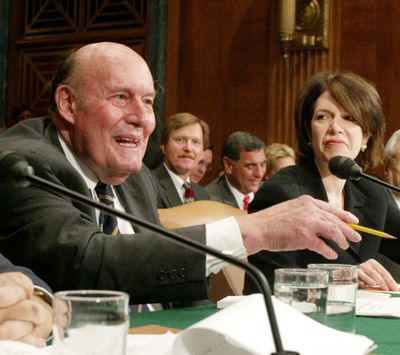Aide who served under Kennedy, Johnson dies
Katzenbach played role in civil rights, Vietnam War

TRENTON, N.J. – Nicholas Katzenbach, who held influential posts in the Kennedy and Johnson administrations and played a prominent role in federal desegregation efforts in the South, has died. He was 90.
Martin Mbugua, a spokesman for Princeton University, said Katzenbach died Tuesday night at his home in Skillman, N.J.
Katzenbach’s eight years in government during the 1960s began with the idealism of Robert Kennedy’s Justice Department and ended in the exhaustion and despair of the Johnson administration’s State Department. Katzenbach never was as famous as the men he worked for, but few government officials were so engaged in so many historical moments, both in the U.S. and overseas.
“Throughout his long and singular career in the nation’s service, Nicholas Katzenbach combined realism, loyalty, and supreme equability with a bedrock devotion to principle, especially on civil rights, said Princeton history professor Sean Wilentz, a friend of Katzenbach. “He was one of his generation’s giants, and history will remember him that way.”
Katzenbach was a graduate of Princeton and Yale, and a former prisoner of war. He had the intellect and resolve that Robert Kennedy was looking for as he staffed his Justice Department. Burke Marshall, future Supreme Court Justice Byron White and future Watergate prosecutor Archibald Cox were others hired to serve in Justice. Their short time together still is regarded as a high point for the department.
Katzenbach wrote a legal brief in support of President John F. Kennedy’s decision to blockade Cuba during the 1962 missile crisis and helped secure the release of prisoners captured during the disastrous Bay of Pigs raid on Cuba in 1961. He became a deputy attorney general in 1963 and, after Kennedy’s assassination, served as attorney general and an undersecretary of state under Lyndon Johnson.